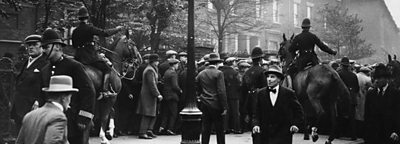Broadcasting was still in its infancy when the values laid down by young John Reith, the founding Director-General, were first put to the test.
For nine days in May 1926 the nation's industry was at a standstill in the General Strike. Many of the newspapers stopped printing, so there were few means of communication between authorities and the populace.
But there was the tiny British Broadcasting Company, forerunner to the Βι¶ΉΤΌΕΔ. The Conservative government had its own British Gazette, launched and edited by the Chancellor, Winston Churchill, but Churchill could see that radio was a more immediate and versatile medium in the chaos of the strike, and he lobbied Prime Minister Stanley Baldwin to commandeer the Company.
Reith, just 37 years old, but remarkably acute, lobbied back. He argued, in a series of exchanges with Baldwin, that such a move would destroy the Company's reputation for independence and impartiality, and it is a tribute to his acumen and persuasiveness that it was he, and not the political heavyweight, who won. Baldwin ruled, the day before the strike ended, that the Βι¶ΉΤΌΕΔ should remain independent. ("Monstrous," Churchill called it.)
But there were compromises. Reith argued afterwards that the Conservative, Labour and trade union perspectives in the crisis had been reported even-handedly, but the Labour Party and the TUC did not forgive the Βι¶ΉΤΌΕΔ for refusing airtime to their representatives - including Opposition leader Ramsay MacDonald.
